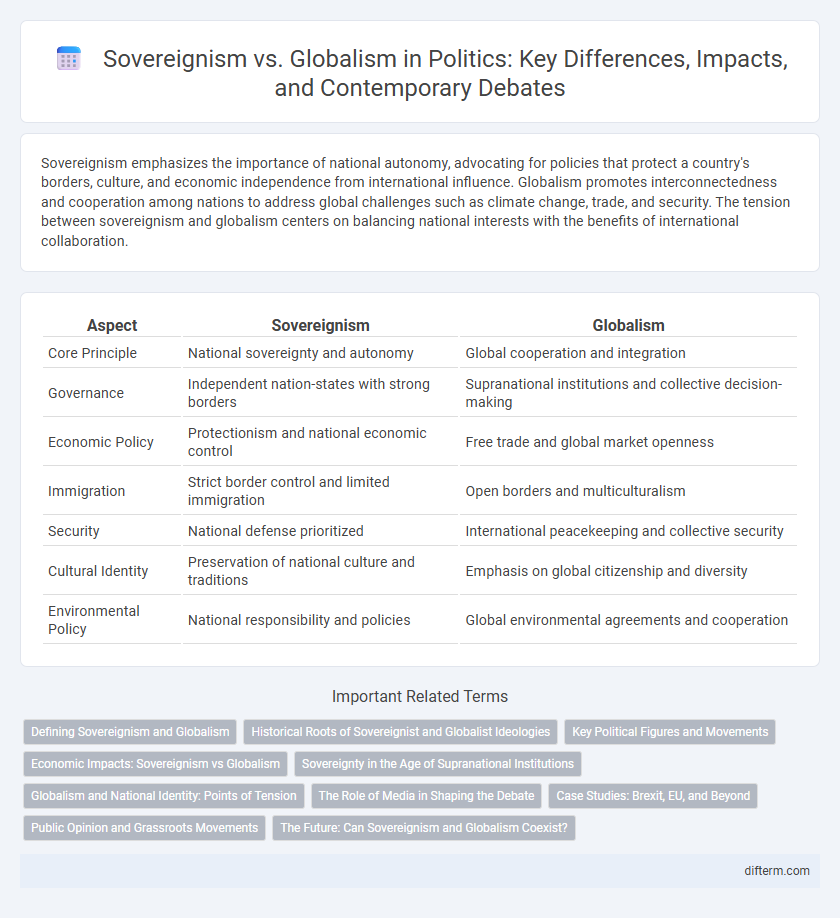Sovereignism emphasizes the importance of national autonomy, advocating for policies that protect a country's borders, culture, and economic independence from international influence. Globalism promotes interconnectedness and cooperation among nations to address global challenges such as climate change, trade, and security. The tension between sovereignism and globalism centers on balancing national interests with the benefits of international collaboration.
Table of Comparison
| Aspect | Sovereignism | Globalism |
|---|---|---|
| Core Principle | National sovereignty and autonomy | Global cooperation and integration |
| Governance | Independent nation-states with strong borders | Supranational institutions and collective decision-making |
| Economic Policy | Protectionism and national economic control | Free trade and global market openness |
| Immigration | Strict border control and limited immigration | Open borders and multiculturalism |
| Security | National defense prioritized | International peacekeeping and collective security |
| Cultural Identity | Preservation of national culture and traditions | Emphasis on global citizenship and diversity |
| Environmental Policy | National responsibility and policies | Global environmental agreements and cooperation |
Defining Sovereignism and Globalism
Sovereignism emphasizes national autonomy, prioritizing a country's control over its laws, borders, and economic policies to protect cultural identity and political independence. Globalism advocates for interconnectedness and cooperation among nations, promoting open borders, global governance, and integrated economies to address transnational challenges such as climate change and trade. The debate centers on balancing national sovereignty with the benefits of international collaboration in an increasingly interdependent world.
Historical Roots of Sovereignist and Globalist Ideologies
Sovereignist ideologies trace back to the Treaty of Westphalia in 1648, which established the principles of state sovereignty and non-interference in domestic affairs. Globalist thought emerged prominently during the 20th century with the creation of international bodies such as the League of Nations and later the United Nations, promoting cooperation beyond national borders. Historical conflicts, including the Cold War, further defined the divide between nationalist sovereignty and globalist integration priorities.
Key Political Figures and Movements
Prominent figures such as Marine Le Pen in France and Viktor Orban in Hungary champion sovereignism, advocating for national sovereignty and strict immigration controls to preserve cultural identity. Conversely, globalist leaders like Emmanuel Macron and Justin Trudeau promote international cooperation, free trade, and multilateralism to address global challenges. Key movements include the Sovereignist movement emphasizing national self-determination, opposed by globalist organizations like the World Economic Forum that support interconnected governance.
Economic Impacts: Sovereignism vs Globalism
Sovereignism prioritizes national economic control, emphasizing protectionist policies, tariffs, and state-led industrial strategies to safeguard domestic industries and jobs. Globalism advocates for open markets, free trade agreements, and cross-border investments, enabling economic efficiency, scale, and innovation through international collaboration. The economic impacts reveal sovereignism often limits growth potential and raises consumer costs, while globalism drives GDP expansion but can increase vulnerability to global market fluctuations.
Sovereignty in the Age of Supranational Institutions
Sovereignty in the age of supranational institutions faces significant challenges as national governments navigate the balance between maintaining autonomous control and participating in global governance. The rise of entities like the European Union and United Nations exemplifies the shift towards pooled sovereignty, where decision-making authority is partially ceded to supranational bodies to address transnational issues such as climate change, security, and trade. This dynamic creates a tension between sovereignist movements advocating for national self-determination and globalist agendas promoting international cooperation and integration.
Globalism and National Identity: Points of Tension
Globalism promotes interconnected economic and political systems that often challenge traditional national identity by encouraging cultural integration and cross-border cooperation. Tensions arise as citizens and governments seek to preserve sovereignty while participating in global institutions, leading to debates over immigration, trade policies, and regulatory standards. These conflicts highlight the struggle to balance national interests with the demands of an increasingly interdependent world order.
The Role of Media in Shaping the Debate
Media outlets significantly influence the framing of sovereignism versus globalism by selecting narratives that emphasize national identity or global cooperation. Coverage patterns and editorial stances shape public perception, often amplifying polarized views and impacting political discourse. Digital platforms further accelerate the spread of tailored content, reinforcing ideological divides and shaping voter behavior on sovereignty and globalization issues.
Case Studies: Brexit, EU, and Beyond
Brexit exemplifies sovereignism through the UK's decision to reclaim legislative and border control from the EU, highlighting national autonomy over supranational governance. Contrarily, the EU represents globalism by promoting economic integration, free movement, and collective policymaking among member states to enhance global competitiveness and stability. Beyond Europe, the tension between sovereignism and globalism continues to shape international relations, as countries balance sovereignty with participation in global institutions such as the United Nations and World Trade Organization.
Public Opinion and Grassroots Movements
Public opinion on sovereignism versus globalism reveals a growing divide, with grassroots movements increasingly advocating for national sovereignty to protect local cultures and economic interests. Surveys indicate that a significant portion of the population favors policies limiting international agreements to ensure domestic control over immigration and trade. These bottom-up mobilizations influence political discourse by challenging globalization trends perceived as undermining national autonomy.
The Future: Can Sovereignism and Globalism Coexist?
Sovereignism emphasizes national independence and the protection of cultural identities, while globalism advocates for interconnected economies and shared governance to address transnational challenges. The future may hinge on hybrid models that balance national sovereignty with global cooperation, enabling countries to retain policy control while engaging in multilateral solutions. Successful coexistence requires robust frameworks that respect diverse political systems and prioritize both local autonomy and collective global interests.
sovereignism vs globalism Infographic

 difterm.com
difterm.com